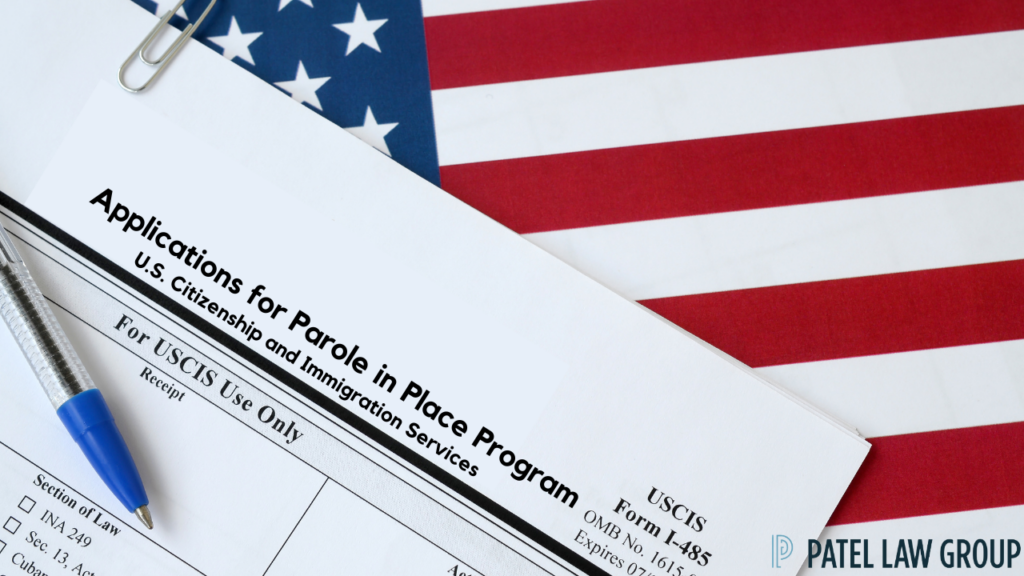Starting August 19, 2024, U.S. Citizenship and Immigration Services (USCIS) began accepting online applications for its new Parole in Place program, introduced under the “Keeping Families Together” initiative.
This program is designed to assist non-citizen spouses and stepchildren who entered the U.S. without proper admission or parole. By granting temporary Parole in Place, these individuals can now access benefits such as Adjustment of Status without the need to leave the country.
Eligibility criteria
To qualify non-citizen spouses must demonstrate the following:
- Must be present in the U.S. without admission or parole.
- Must have been continuously present in the U.S. since June 17, 2014, until the date of filing.
- Must be legally married to a US Citizen as of June 17, 2024.
- Must not have a disqualifying criminal history, must pose no threat to national or public safety, and must demonstrate that they warrant a favorable exercise of discretion.
Non-citizen stepchildren must:
- Be under the age of 21 and unmarried as of June 17, 2024.
- Have a noncitizen parent and a U.S. Citizen parent who were legally married prior to their 18th birthday.
- Be present in the U.S. from June 17, 2024, until the date of filing (the 10-year continuous presence requirement does not apply to stepchildren).
Stepchildren are required to submit a separate application.
Process
To apply for Parole in Place, applicants must file Form I-131F, Application for Parole in Place for Certain Noncitizen Spouses and Stepchildren of U.S. Citizens. The form must be filed online along with a filing fee of $580, with no exceptions or fee waivers available.
Applicants are required to submit biometrics and undergo background checks, although USCIS may use previously submitted biometrics if they remain valid.
Each request under this process is individually evaluated, with discretion exercised based on the unique circumstances of the case. The decision to grant parole considers whether it is justified for significant public benefit or urgent humanitarian reasons. While an interview may be required, it is expected to be waived in most cases. Because this program is discretionary, USCIS can deny an application without first issuing a Request for Further Evidence (RFE) or Notice of Intent to Deny (NOID).

Authorized period of parole.
If granted Parole will be authorized for 3 years from the date USCIS approves your application. However, USCIS has the discretion to terminate your parole, for example, following the commission of a crime.
Documentation
Applicants are required to submit documentation to demonstrate continuous physical presence. Spouses must demonstrate that they have physically resided since June 17, 2014. USCIS has provided a list of helpful documentation along with other helpful information:
- Internal Revenue Service tax transcripts listing tax information.
- Rent receipts or utility bills.
- Deeds, mortgage statements, or rental contracts.
- Bank, credit card, or loan statements showing regular transactions.
- Insurance policies.
- Automobile license receipts, title, or registration.
- Hospital or medical records.
- School records (letters, report cards, etc.).
- Attestations to your physical presence by religious entities, unions, or other civic or community organizations.
- Official records from a religious entity confirming your participation in a religious ceremony.
- Birth certificates for children born in the United States.
- Money order receipts for money sent into or out of the United States.
- Any other document that shows that you maintained your physical presence in the United States.
Filing for adjustment of status and or an employment authorization.
Individuals who entered the U.S. illegally no longer need to leave the country or apply for a waiver to adjust their status. They can now file for adjustment of status and employment authorization.
However, USCIS does not permit concurrent filings, so parole must be granted before adjusting status.
Conclusion
This program is a significant and welcome development, aiming to keep families together—hence its name. Previously, individuals who entered the country illegally and married a U.S. citizen could be the beneficiary of an I-130 petition but were required to leave the country for consular processing. Those who had remained in the U.S. for six months or more were subject to a 3- or 10-year bar upon departure and were required to file a waiver. The new program eliminates the need for both travel and filing a waiver.
There are already reports of applicants receiving approvals. However, Texas and 15 other states have filed a lawsuit, accompanied by a temporary restraining order, arguing that the program is unlawful. Despite this, USCIS will continue accepting applications, but the future of the program remains uncertain. Even without the lawsuit, the upcoming election may cause concern about its potential future. If the program is struck down or rescinded, possibly under a future administration like a Trump government, those who have already been paroled will retain the benefits of their parole, as it cannot be revoked. Therefore, eligible individuals should consider applying as soon as possible.
If you have questions regarding the above process, please contact PLG Partner, Chris Prescott at cprescott@patellegal.com.